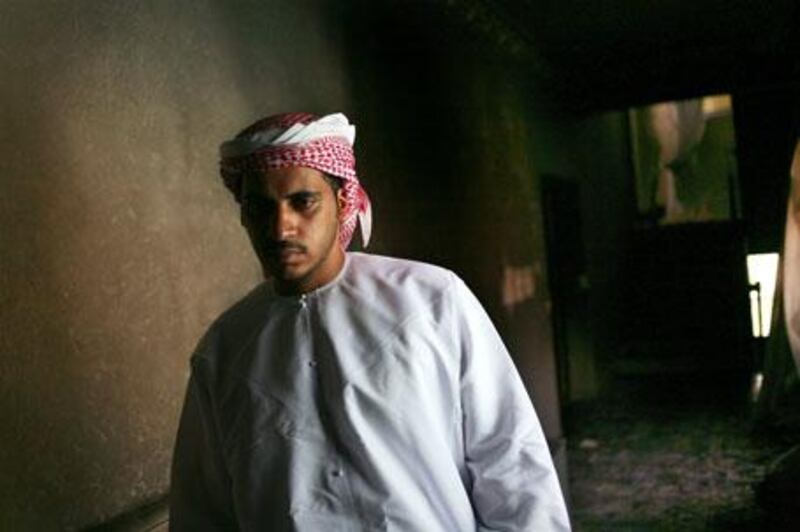AL AIN // "That was one of Rawda's toys. God have mercy on her." Ahmed al Kalbani, Rawda's uncle, was pointing to a doll streaked with soot. The doll was in a pile of toys strewn about the floor of a bedroom in a house in Al Ain's Um Ghafa neighbourhood. Its bathroom was where his sister-in-law and her two children died on Tuesday night.
Yesterday, after spending two days with police inspectors examining the house, which is in a remote neighbourhood from where one can make out the outline of Jebel Hafeet, Ahmed was able to piece together the tragedy. What he remembers first is receiving a call from his brother, Mohamed, at about 10.50pm on Tuesday night. Along with most of the men in the family, he was at a memorial service. The women and children were at his father's home.
His brother was asking him desperately, "What happened at the house?". He called his sister there. "She was screaming that there's a fire," he said. When Ahmed got to the house, firemen were already trying to douse the blaze. It took them just 10 minutes to put out the actual fire, he said, but it took them some time to reach the bodies of the victims because the house was filled with smoke. Police said it took two hours to put out the fire completely because of the place was engulfed in "a cloud of smoke".
Suffocation claimed Khawla Fadel, Mohamed's wife, and their two children, Suhail and Rawda, who were 18 months old and four years old, respectively. "We had registered [Rawda] in the nursery and were just waiting for the school term to start," Ahmed said. The three were trapped in the upper part of the house because of where the fire started. Standing in the soot-blackened hallway, he pointed to the stairwell and said: "We think the beginning was there."
The house's majlis was untouched by the fire, but the corridor and upper floor were wet and littered with broken glass. Ahmed said the billowing smoke trapped Khawla and the children upstairs. The police told him they were found in an upstairs bathroom. They believe she brought the children in there to try to keep them safe from the fire. The wife of another of his brothers named Fahd, who was also in the house, tried to rush upstairs when she heard their screams, but was stopped by the dense smoke.
She was taken to the hospital where she is recovering, Ahmed said. Fahd's daughter, Reem, was also upstairs in a different room and was rescued by firemen. "Al hamdulillah for everything," Ahmed said. In total, three women and two children, most of them relatives, who were in the house survived and were treated at Al Ain Hospital. The children's grandfather was also taken to Al Tawam Hospital after suffering a heart attack when he reached the burning house. He was released yesterday.
"He collapsed," said Ahmed. "He walked from the car to the front of the house and he just fell, before he even knew what happened to the children." Standing in the front door of the two-storey house, Abdullah al Zahry, head of a Abu Dhabi Police team sent to investigate the cause of the fire, that the investigation was still in its early stages and he could not yet make an official announcement as to the cause of the fire.
However, Abu Dhabi Police yesterday released a statement yesterday saying they believed the fire was caused by the combination of an electric spark and a traditional bukhoor or incense brazier, which may have ignited. Col Hamad al Tamimi of the Al Ain Police warned people not to leave incense braziers unattended on the ground, in closets or near children, since they can rapidly cause fires that are hard to control.
Sheikh Saif bin Zayed, the Minister of Interior, also offered his condolence to the family yesterday. Other family members visiting the house yesterday expressed shock and resignation at what they felt was a matter of destiny. "We say 'What if?' Everything belongs to Allah. Allah gives, and Allah takes," said Gomaa Sayed, a cousin of Ahmed and Mohamed. Khalfan Saif, another relative, was helping them move out clothes and other belongings. "I feel like any person who just lost his loved ones," he said, fighting back tears.
newsdesk@thenational.ae







